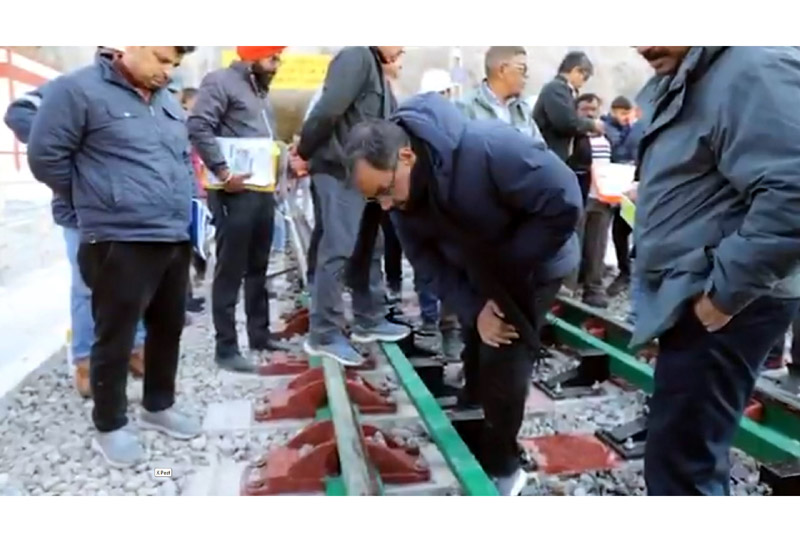JAMMU, Jan 8: With a successful “rising grade” speed trial in the challenging terrain from Katra to Banihal section of Udhampur-Srinagar Baramulla Rail Link (USBRL) project, Commissioner of Railway Safety today concluded its two-day statutory inspection and trial, offering a positive indication for an early start to direct rail service between Kashmir and rest of the country.
According to CRS Dinesh Chand Deshwal, they would analyse the data collected after completion of the two-day statutory inspection and send a report to the Centre for taking a final decision to start the much-awaited train service to Kashmir.
“The trial run at 110 kilometres per hour on the 180-degree rising grade in such a challenging geography from Katra to Banihal has written a new chapter in the history of the Railways. The trial run was smooth and filled us with a sense of fulfilment and the credit for it goes to our engineers who have done such great work,” the CRS said while talking to reporters on reaching Banihal after the successful high-speed trial run from Katra Station.
The trial train left Katra station at 10:30 am and reached Banihal station within one-and-a-half hours. The train left for Katra on its return journey at 2 pm and reached its destination at 3:30 pm. This was the final speed trial run on the trek.
Deshwal, who reached Katra on a two-day statutory inspection of the newly completed railway line, said the Centre would take the final decision on the start of services between Kashmir and the rest of the country.
“I am not in a position to talk about start of services. The statutory inspection will be completed by this evening and all the gathered data analysed in accordance with guidelines of the Northern Railway,” he said.
The CRS said the inspection and the trial run on the trek had been satisfactory so far. “Our infrastructure is outstanding and very soon a fair decision will be taken based on our report,” he added.
On reaching Katra, Deshwal said the speed trial run on the falling gradient from Banihal to Katra was also satisfactory. “It was fully successful on both sides…the train also passed through T-30 (tunnel-30) at a speed of 110 kmph. This tunnel posed some challenges during the construction process but the engineers overcame the technical solutions and made the track alignment precisely fit for this speed,” he said.
On January 4, a successful trial run of an electric train was conducted on the Katra-Banihal section. The Railways have conducted six trial runs over the past month on various segments of the track, including the two major milestones of the Anji Khad and Chenab bridges.
With the completion of final safety inspection, 111 Km long Banihal-Katra Section in the newly constructed, jammu division, the rail commuters can expect a world class travel experience on this route from later this year as Jammu station is being redeveloped for equipping it with 8 platforms and modern amenities.
According to an official spokesperson, an 8- coach Jammu Srinagar Vande Bharat express between Katra to Srinagar will start running soon. With this transformation, the long wait of train connectivity between Kashmir Valley & Jammu will be over.
The completion of Banihal-Katra section has been an engineering marvel in which 97 KMs of length is tunnel and 7 KMs of distance is covered by 4 main bridges. The toughest challenge in the project was to give foundation support to World’s highest arch bridge (i.e 359 m) on Chenab River. It was achieved by rock bolting method using 30,000 tonnes of steel. The other main challenge was to build India’s first cable stayed bridge on Anji River. The two other bridges on the section are Reasi Bridge and Bakkal Bridges.
While executing the project, Railways engineers innovated the technique of Himalayan tunneling over conventional tunneling method to overcome safety concerns and give strength to main as well as 67 KMs of escape tunnels. The tunnels have completely ballast less track as is used on the metro tracks with no joints. The longest tunnel in this section of the Udhampur-Srinagar-Baramula Rail Link (USBRL) project i.e. T50 is of 12.77 KM length. Cameras are placed at every 50 M in the tunnels to keep an eye on safety and operational data. These Cameras are connected to a state of the art central control room. Railways have also built 215 KMs roads in the region to access the project sites, which is benefiting local people.
Jammu-Srinagar Vande Bharat train is especially designed with anti freezing features. The Snow removal train, moving ahead of passenger and freight trains will make sure that trains on this strategic route run all through the year, day and night. This will ensure all weather connectivity between both the regions. To give passengers a comfortable & safe travel experience, Railways has used Anti-Vibration seismic devices in the project as this region falls in zone-V earthquake vulnerability. These dampers will absorb the tremors in the Himalayan terrain and thus maintain faster and safer travel to the commuters.
The Vande Bharat Express running in Kashmir is different from the Vande Bharat Express running across the country. It is specially designed to operate smoothly in extreme cold conditions, i.e. as low as -20°C. To ensure comfort for passengers and drivers, the train is equipped with advanced heating systems. The driver’s cabin features heated windshield to prevent it from fogging up or freezing, ensuring clear visibility in extreme temperatures. Further the train has heating elements in the plumbing and bio-toilets to prevent water from freezing, ensuring that essential systems continue to function during cold weather.




